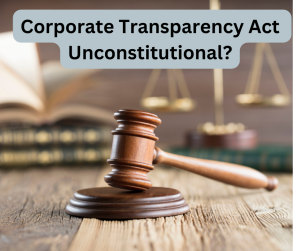While Congress might have had worthwhile purposes in passing the Corporate Transparency Act, a section of the 2021 National Defense Authorization Act, it’s nonetheless unconstitutional, according to a federal judge’s summary judgment ruling in an Alabama case brought by the National Small Business Association (NSBA).
The Act requires most entities incorporated under state law to provide the U.S. Treasury Department’s criminal enforcement arm with significant personal information about their stakeholders, in an attempt to prevent money laundering, tax evasion and other financial crimes that often make use of shell corporations.
However, U.S. District Judge Liles C. Burke of the Northern District of Alabama ruled, in an opinion dated March 1 that, however well-intentioned, the requirements of the Corporate Transparency Act could not be justified as an exercise of Congress’ enumerated powers. The judge thus granted summary judgment to the plaintiffs in the case (National Small Business United, d/b/a the National Small Business Association, et al, v. Janet Yellen, in her official capacity as Secretary of the Treasury, et al, Case 5:22-cv-01448-LCB).
“This case presents a deceptive simple question: Does the Constitution give Congress the power to regulate those millions of entities and their stakeholders the moment they obtain formal corporate status from a State? The Government thinks so,” Burke wrote. “While it acknowledges that Congress ‘can exercise only the powers granted to it,’ the Government says that the CTA is within Congress’ broad powers to regulate commerce, oversee foreign affairs and national security, and impose taxes and related regulations.”
But Burke does not believe the government’s arguments are supported by precedent. “Because the CTA exceeds the Constitution’s limits on the legislative branch and lacks a sufficient nexus to any enumerated power to be a necessary or proper means of achieving Congress’ policy goals, the Plaintiffs are entitled to judgment as a matter of law,” the opinion reads.
The NSBA and Isaac Winkles, a business owner in Huntsville, Ala., first brought the case in 2022, according to an article in the trade journal Produce Grower. “[T]he U.S. Treasury Department’s implementation of the CTA has fallen short of expectations—millions of small-business owners still do not know about the requirements of the CTA,” wrote Katie McDaniel of Produce Grower. “The database is ripe for data security issues and confusion, which could saddle small-business owners with hefty penalties or even jail time.”
Todd McCracken, president and CEO of NSBA, which believes the Act could have cost small businesses $8,000 in compliance costs per year, on average, told McDaniel that the CTA has unfairly targeted small businesses.
“This ruling justifies the concerns of millions of American businesses about how the CTA is not only a bureaucratic overreach, but a Constitutional infringement,” he said. “The judge’s decision is an opportunity for Congress to go back to the drawing board and find a solution that will truly protect Americans from bad actors. The CTA simply will not accomplish the goal of stemming money-laundering—what it does is overstep the bounds of privacy, the law, and common sense at the expense of America’s small businesses.”
“As the court noted, the ultimate goals of the CTA, countering money laundering and terrorism financing, are laudable,” added John Neiman, who represented the NSBA and Winkles. “But as the court also noted, the Constitution gets limited on what Congress can do to achieve even the most laudable of goals, and Congress violated those limits here. Congress can find a way to achieve these goals without exceeding the limits on its powers under the Constitution.”
However, the stay on the enforcement only applies to members of the NSBA. Other business entites must still comply withe requirements of the act.

